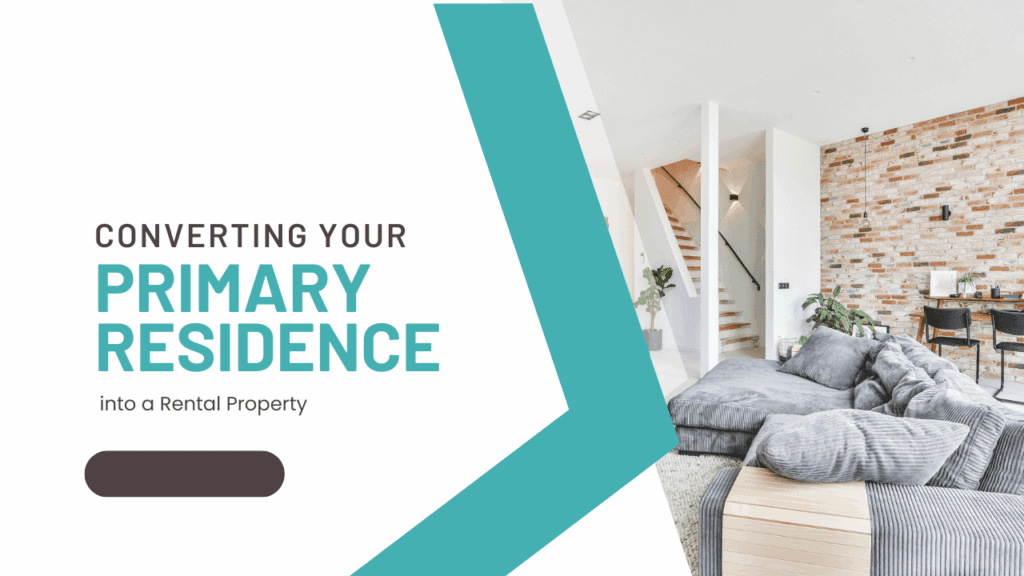
Thinking about turning your primary residence into a rental property?
This is a smart move, especially if you don’t plan to live in the home any longer, but you know you don’t want to sell it. Maybe you’re relocating for work, upgrading to a new home, or downsizing for retirement. Your home has the potential to serve as a valuable income-generating asset.
But before you list it for rent, there are important decisions and steps to take. From choosing between long-term tenants and short-term vacation guests, to understanding tax implications, insurance, and local laws, this transition requires more than a rental listing and a lease.
Let’s walk you through everything you need to know to successfully convert your primary residence into a rental.
Quick Overview:
|
Why Convert Your Primary Residence into a Rental?
Converting your home into a rental property can provide a number of valuable benefits, including:
- Passive income to supplement your mortgage, retirement, or other investments
- Asset appreciation while renters contribute to your costs
- Flexibility if you plan to return to the home in the future
- Tax benefits, including deductions for depreciation, repairs, and operational expenses
Whether you go long-term or short-term, renting your former home can be a stepping stone toward financial independence and a growing real estate portfolio.
Understand Your Rental Options
There are two common paths when it comes to turning your home into a rental. You can create a long-term rental or a short-term (vacation) rental. Each offers distinct advantages and challenges.
Long-term rentals are typically a one-year lease, with the option to renew at the end of that lease term. You can expect consistent monthly income, less frequent turnover and maintenance, and generally fewer management demands once tenants are in place. However, you will have less flexibility to use the property for yourself, and landlord-tenant laws will apply. You’ll want to screen tenants carefully and pay attention to maintenance and upgrades to keep those tenants happy.
With a vacation rental, you’ll rent the property out for shorter periods (a few nights to a few weeks), usually on platforms like Airbnb, Vrbo, or Booking.com. This can provide you with potentially higher income, especially during strong tourist seasons. You’ll have more flexibility to block dates for personal use, and you won’t have to worry about laws around security deposits, evictions, and tenant protections.
The challenges of short-term rentals are the higher turnover and ongoing cleaning/maintenance needs. There tends to be more guest communication and calendar management as well.
Deciding on which type of rental is right for you depends on your location, lifestyle, and risk tolerance. For example, a condo in a tourist area may thrive as a short-term rental, while a suburban home near good schools might be ideal for long-term tenants.
Check Legal and HOA Restrictions
Before moving forward, make sure you’re legally allowed to rent your property. Florida is fairly landlord-friendly, and vacation rentals cannot be prohibited. The biggest challenge you could run into is with your HOA, if you’re in one.
If your home is part of a homeowners’ association (HOA) or condo board, review their bylaws. Many HOAs restrict short-term rentals entirely, or impose minimum lease terms for long-term rentals (e.g., 6 or 12 months).
Talk to Your Lender
If you have a mortgage on the property, you’ll need to ensure your loan terms allow for rental use.
Conventional mortgages for primary residences can sometimes include an “owner-occupancy clause” which might require you to live in the home for a specific period of time. If that period has passed, you can typically convert it without issue.
However, if you plan to move out soon after closing or never moved in at all, you’ll need to talk with your lender about converting the mortgage or refinancing into an investment property loan, which usually has slightly higher rates.
Switch Insurance Policies
Your current homeowners insurance only covers owner-occupied properties. Once the home becomes a rental, you’ll need to convert your policy into:
- Landlord insurance (for long-term rentals), which covers the structure, liability, and often loss of rental income.
- Short-term rental insurance (for vacation rentals), which combines landlord-style protection with some elements of hospitality coverage.
Don’t skip this step. If you file a claim under a homeowners policy after converting the home, your insurer could deny coverage.
Get the Property Rent-Ready
Whether long-term or short-term, your home needs to be prepared for its new purpose. Once you decide to rent out the home, you have to begin looking at it from a tenant’s perspective. That squeaky door that you always tolerated has to be fixed. The standards for cleanliness are now higher than if you were living there yourself. How does the landscaping look?
- Repair and refresh. Fix any outstanding maintenance issues, patch walls, touch up paint, service HVAC systems, and ensure plumbing and electrical are sound.
- Safety first. Install smoke detectors, carbon monoxide detectors, and fire extinguishers. Make sure doors and windows lock properly.
- Deep clean. A professional cleaning gives a fresh start and sets the tone for how the home should be maintained.
Additional prep may be required if you’re renting it out on the short-term or vacation market. You’ll have to furnish and decorate. Guests expect a fully furnished space, including beds, seating, kitchenware, linens, and decor. Create a guidebook for your guests that includes house rules, Wi-Fi instructions, and local recommendations.
Partner with a Property Manager
Managing a rental takes time and organization. If you’re moving out of the area, professional management is essential. If you’re remaining close by, you still have a lot to gain from partnering with a professional, especially if you’ve never rented out a home before. Professional property management saves time and stress. Professionals handle marketing, tenant screening, repairs, and more.
There’s a property management fee, which typically ranges from 8–12% of monthly rent (long-term) or 20–30% of gross revenue (short-term). You’ll find you get a lot of value for this fee, however, and much more peace of mind.
Understand the Financial and Tax Implications
Converting your home to a rental changes how you treat the property on your taxes. Rental income is taxable, but you can deduct a wide range of expenses:
- Property management fees
- Repairs and maintenance
- Insurance
- Mortgage interest
- Property taxes
- Depreciation
You’ll report rental income and expenses on Schedule E of your federal tax return. As a rental property, the IRS allows you to depreciate the home over 27.5 years (excluding land value), which can significantly reduce your taxable rental income, but this may be subject to “recapture” tax when you sell.
Always consult with a tax professional before converting your home. Proper planning can save thousands in taxes and ensure compliance.
Price Your Rental Home Strategically
Now that you’ve made some important decisions and worked around the paperwork and hired the right professionals, it’s time to rent it out. Success begins with setting the right price. This is critical to attracting the right tenants or guests.
For long-term rentals, research local comparable rentals. Make sure they’re the same size, have the same amenities, and are in the same neighborhood. Your property manager should be able to access some good data that can help you stay competitive while ensuring cash flow.
For short-term rentals, use dynamic pricing tools that give you a nightly rate that’s both profitable and competitive. You’ll have to adjust your rates based on season, local events, and competition. Your property managers should be tracking occupancy rates and nightly rates regularly.
Market Your Rental Property
 Now, it’s time to find your first tenant or guest. List your property on all the popular websites that get the most traction. Make sure you’re investing in high quality photos and writing good descriptions. Be responsive. Local tenants will want to schedule showings. Vacation guests may have a lot of questions.
Now, it’s time to find your first tenant or guest. List your property on all the popular websites that get the most traction. Make sure you’re investing in high quality photos and writing good descriptions. Be responsive. Local tenants will want to schedule showings. Vacation guests may have a lot of questions.
Don’t forget to advertise and share on social media, too. Marketing is a big part of attracting the right tenants and guests. Lean on the expertise of your property manager when it comes to creating the listing, responding to questions, and signing leases or contracts.
Converting your primary residence into a rental property requires planning, investment, and a clear understanding of what’s involved. Whether you choose a long-term tenant who settles in for a year or a stream of vacationers enjoying weekend stays, the key to success is preparation and professionalism.
We can help you enjoy a profitable and stress-free rental experience. Please contact us at Anchor Down Real Estate & Rentals. We can help you through every step of the process, starting with deciding to rent out your home.
